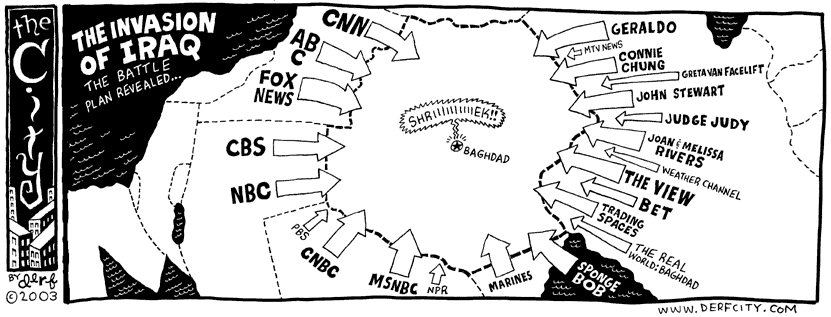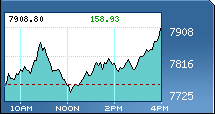- Tell the Truth
By THOMAS L. FRIEDMAN
... I don't have much applause in me for China, Russia — or the Bush team either. I feel lately as if there are no adults in this room (except Tony Blair). No, this is not a plague-on-all-your-houses column. I side with those who believe we need to confront Saddam — but we have to do it right, with allies and staying power, and the Bush team has bungled that.
The Bush folks are big on attitude, weak on strategy and terrible at diplomacy. I covered the first gulf war, in 1990-91. What I remember most are the seven trips I took with Secretary of State James A. Baker III around the world to watch him build — face-to-face — the coalition and public support for that war, before a shot was fired. Going to someone else's country is a sign you respect his opinion. This Bush team has done no such hands-on spade work. Its members think diplomacy is a phone call.
They don't like to travel. Seeing senior Bush officials abroad for any length of time has become like rare-bird sightings. It's probably because they spend so much time infighting in Washington over policy, they're each afraid that if they leave town their opponents will change the locks on their office doors.
Friedman goes on to criticize the administration for (1) allowing the Korea situation to blow up while trying to deal with Iraq, (2) stomping on international treaties without offering alternatives, and (3) making tenuous connections, at best, between Saddam and Osama bin Laden. As in...
- I am also very troubled by the way Bush officials have tried to justify this war on the grounds that Saddam is allied with Osama bin Laden or will be soon. There is simply no proof of that, and every time I hear them repeat it I think of the Gulf of Tonkin resolution. You don't take the country to war on the wings of a lie.
Which is precisely what I have been saying all along. The difference between myself and Friedman is that he is still willing to support the Bush efforts
despite the lies while I insist that we should never go to war if lies are used to justify it. Bush has already lost the public relations battle. He blew it pretty much from the first day he took office.
It is obvious from this column that Friedman is struggling mightily to stay on the side of the Bush administration. He is still clutching the tenuous promise that the removal of Saddam could produce a Democratic Iraq that could be a model for the middle-east. But this is a pipe-dream at best and a dream that will be even harder to fulfill than simply continuing the containment regime.
- Tell people the truth. Saddam does not threaten us today. He can be deterred. Taking him out is a war of choice — but it's a legitimate choice. It's because he is undermining the U.N., it's because if left alone he will seek weapons that will threaten all his neighbors, it's because you believe the people of Iraq deserve to be liberated from his tyranny, and it's because you intend to help Iraqis create a progressive state that could stimulate reform in the Arab/Muslim world, so that this region won't keep churning out angry young people who are attracted to radical Islam and are the real weapons of mass destruction.
The problem, my friend, is that this case will not sell because Americans do not
want to invest that heavily in an idea with so little hope of becoming a reality. Furthermore, most people understand that it is a formula almost guaranteed to
inflame hatred in the middle-east. I think even you understand that Tom. But you want so much to believe that Bush can do it that you are willing to give him the chance.
- It is legitimate for Europeans to oppose such a war, but not simply by sticking a thumb in our eye and their heads in the sand. It's also legitimate for the Bush folks to focus the world on Saddam, but two years of their gratuitous bullying has made many people deaf to America's arguments. Too many people today no longer accept America's strength as a good thing. That is a bad thing.
And who is to blame for that? Bush and the people who have enabled him and his failed "diplomacy". People like Thomas Friedman, who want desperately to believe that Bush really could be the champion of a new kind of foreign policy.
What they never understand is that Bush's entire foreign policy is as simple as this: do what I say and shut the fuck up.
- Some of this we can't control. But some we can, which is why it's time for the Bush team to shape up — dial down the attitude, start selling this war on the truth, give us a budget that prepares the nation for a war abroad, not a party at home, and start doing everything possible to create a global context where we can confront Saddam without the world applauding for him.
To late Tom. Bush has burned so many bridges that even Colin Powell's reputation as the most trusted man in the world has been destroyed. It will take decades
after this man leaves office to rebuild the kind of faith in America that existed when he took office, if it can be rebuilt at all. I do not envy the job Bush's successor will have. I just hope he (or she) will start in 2005 instead of 2009.


 Picture courtesy
Picture courtesy 

 The stock market has been in the doldrums for weeks. It has falling several hundred points as the Bushies have pounded the war drums harder and harder. Even Alan Greenspan in his testimony suggested that all the war talk was holding back the U.S. economy.
Blix delivered his report this morning and much of the UN seems to be siding with the idea of continued inspections and no war...for now.
And the stock market goes through the roof!
So, not only is Bush's foreign policy fucked, it is fucking with his economic policy as well.
Unfortunately, we are the ones getting screwed.
The stock market has been in the doldrums for weeks. It has falling several hundred points as the Bushies have pounded the war drums harder and harder. Even Alan Greenspan in his testimony suggested that all the war talk was holding back the U.S. economy.
Blix delivered his report this morning and much of the UN seems to be siding with the idea of continued inspections and no war...for now.
And the stock market goes through the roof!
So, not only is Bush's foreign policy fucked, it is fucking with his economic policy as well.
Unfortunately, we are the ones getting screwed.

 (image courtesy
(image courtesy 





